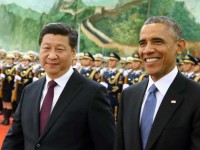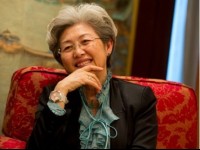Cheng Li, Director, John L. Thornton China Center, The Brookings Institution
Lucy Xu, Senior Research Assistant, Thornton China Center
Dec 04, 2014
The “New Type of Great Power Relations” enables China to establish a code of conduct to protect its core interests, but the U.S. has not completely adopted it out of protection of its own geopolitical allies. For greater endorsement China should advance the interests of smaller nations in the Asia-Pacific, and the U.S. should move beyond its Cold War, realist mentality.
Yu Xiang, Senior Fellow, China Construction Bank Research Institute
Nov 28, 2014
Xi-Obama meetings following the APEC summit helped spur new topics and commitments to bilateral cooperation, most notably with the creation of an impactful new climate treaty. Yu Xiang discusses new international issues – responding to Ebola, IS, and a military reporting mechanism – for extending Sino-U.S. cooperation.
Tao Wenzhao, Honorary Member of the Chinese Academy of Social Sciences; Fellow, CASS Institute of American Studies
Nov 25, 2014
Tao Wenzhou explains how the Xi-Obama Summit achieved four major bilateral goals: increased commitment to create a new bilateral investment agreement, shared reduction of CO2 emissions, more liberal visa regulations for people-to-people exchanges, and new mil-to-mil protocols.
Yang Jiemian, Senior Fellow and Chairman of SIIS Academic Affairs Council
Nov 25, 2014
When evaluating the meeting between Presidents Xi and Obama, the two countries should transcend the mentality of a zero-sum game, and place their main focus on cooperation.

Jia Qingguo, Director and Professor, Institute for Global Cooperation and Understanding, Peking University
Nov 22, 2014
The much anticipated Xi-Obama meeting after the APEC Summit achieved many positive bilateral policy goals: from the increased liberalization of visa and trade tariffs to mutual military cooperation. However, as Jia Qingguo explains, the offensive realist perspectives of individuals in both countries and the fractured U.S. Congress interests will hinder progress.

Nathan Gardels, Editor-in-chief, THEWORLDPOST
Nov 22, 2014
Dialogue between Henry Kissinger and Fu Ying, which took place during a recent visit she made to the United States. Its candor and tone offer valuable insights into the thinking of these two important figures on the foreign policy of their countries.
Yu Sui, Professor, China Center for Contemporary World Studies
Nov 21, 2014
Yu Sui discusses China-Russia power relations built on “the five principles of peaceful coexistence,” which has yielded beneficial economic, security, and diplomatic cooperation between the two nations. Also discussed is the differentiation between Russia and China’s Central Asian ambitions through the respective Eurasian Alliance and Shanghai Cooperation Organization.
Zhou Bo, Senior Fellow, Center for International Security and Strategy, Tsinghua University
Nov 19, 2014
Zhou Bo posits that an essential component to improving frosty Japan-China relations is an equal commitment to develop shared maritime procedures, such as the Code for Unplanned Encounters at Sea (CUES). But first, the two sides need to agree upon a common Air Defense Identification Zone (ADIZ).
Cui Liru, Former President, China Institutes of Contemporary International Relations
Nov 19, 2014
The shortest state visit in the history of the China-U.S. diplomatic relationship yielded important accomplishments in forming a new bilateral relationship, establishing complementary goals, and creating an impactful Joint Declaration on Climate Change.
Stephen Harner, Former US State Department Official
Nov 19, 2014
A reset is needed in the US-China relationship. By much objective analysis, the bilateral relationship has deteriorated during most of the six years of Obama administration and is now the worst it has been in decades, writes Stephen Harner.
Back to Top

- China-US Focus builds trust and understanding between the U.S. and China through open dialogue among thought leaders.
- Our Offerings
- Topics
- Videos
- Podcasts
- Columnists
- Research Reports
- Focus Digest
- Stay Connected
-
Thanks for signing up!
- Get the latest stories from China-US Focus weekly.